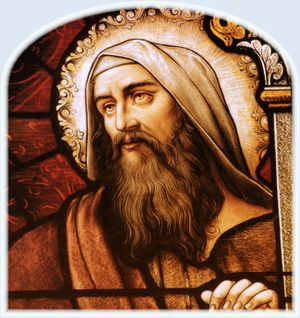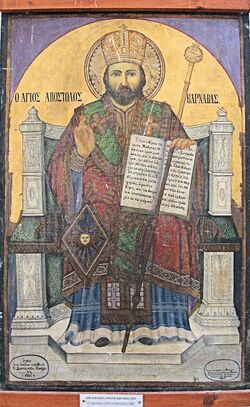Category:Barnabas (subject)
Barnabas was a Jewish follower of Jesus, a leader of the early Christian movement and a companion of Paul of Tarsus. The Letter of Barnabas and the much later Gospel of Barnabas are attributed to him but with no historical foundation.
< Events : Paul and Barnabas in Cyprus (Acts 13:1-12) -- Paul and Barnabas in Antioch of Pisidia (13:13-52) -- Paul and Barnabas in Iconium and Lystra (14:1-28) -- Council of Jerusalem (15:1-34) -- Incident at Antioch (Gal 2:11-21) >
< Fiction : Barnabas (art) -- Barnabas (cinema) -- Barnabas (literature) -- Barnabas (music) >
Overview
Barnabas is mentioned solely in Christian sources, namely, the letters of Paul and Acts.
Joseph Barnabas is first introduced in the Acts of Apostles as "a levite and a native of Cyprus," who joined the early community at Jerusalem. He sold some land he owned and shared the proceeds with the poor (Acts 4)
It was Barnabas who introduced Paul to the leadership of Jerusalem after his "conversion" (Acts 9:27).
When Barnabas then sent from Jerusalem to oversee the growth of the Jesus movement in Antioch of Syria (Acts 11:20-22), he went to Tarsus and asked Paul to assist him.
The partnership of Barnabas and Paul lasted several years. Paul supported Barnabas' leadership in Antioch, went with him to Jerusalem, and traveled with him from Cyprus to Anatolia in a missionary journey (traditionally referred to as Paul's First Missionary Journey). The incident at Lystra shows that Barnabas was the leader (not accidentally, the pagan crowd called him "Zeus"), and Paul ("Hermes") was his spokeperson.
At the Council of Jerusalem, Barnabas and Paul saw their mission to Gentiles (or better, God-fearers) confirmed by the Jerusalem leadership (James, Peter and John) who concentrated on the mission within the Jewish people. However, in the incident at Antioch, Barnabas sided with Peter against Paul, who accused them of hypocrisy ("even Barnabas was carried away by their hypocrisy," Gal 2:13). The rift between Paul and Barnabas was never healed. When Barnabas went with John Mark to Cyprus, Paul took Silas as his companion and journeyed through Syria and Cilicia (see Paul's Second Missionary Journey).
It is the last reference to Barnabas in the earliest Cristian literature.
Later traditions
According to Tertullian, Barnabas was the author of the Epistle to the Hebrews and of the Epistle of Barnabas according to Clement of Alexandria. Both attributions are dismissed by contemporary scholars. In late antiquity Barnabas was also believed to be the author of a gospel, of which nothing has remained. The so-called Gospel of Barnabas is a late post-Islamic composition, attempting to a synthesis between Christian and Muslim traditions on Jesus.
Later Christian tradition honors Barnabas as the founder of the Cypriot Church and holds that he was martyred at Salamis, Cyprus, in 61 AD. The Acts of Barnabas, attributed to John Mark, are a 5th-century work that offer a narrative about the preaching of martyrdom of Barnabas in Cyprus.
Barnabas in ancient sources
First Letter to the Corinthians
1Cor 9:6 -- Is it only Barnabas and I who have no right to refrain from working for a living?
Letter to the Galatians
Gal.2.1 Then after fourteen years I went up again to Jerusalem with Barnabas, taking Titus along with me. Gal.2.9 and when James and Cephas and John, who seemed to be pillars, perceived the grace that was given to me, they gave the right hand of fellowship to Barnabas and me, that we should go to the Gentiles and they to the circumcised. Gal.2.13 And the rest of the Jews acted hypocritically along with him, so that even Barnabas was led astray by their hypocrisy.
Letter to the Colossians
Col 4:10 -- Mark the cousin of Barnabas greets you.
Acts of the Apostles
Acts 4:36 -- Thus Joseph, who was also called by the apostles Barnabas (which means son of encouragement), a Levite, a native of Cyprus,
Acts 9:27 -- But Barnabas took him and brought him to the apostles and declared to them how on the road he had seen the Lord, who spoke to him, and how at Damascus he had preached boldly in the name of Jesus.
Acts 11:22 -- The report of this came to the ears of the church in Jerusalem, and they sent Barnabas to Antioch. Acts 11:25 -- So Barnabas went to Tarsus to look for Saul, Acts 11:30 -- And they did so, sending it to the elders by the hand of Barnabas and Saul.
Acts 12:25 And Barnabas and Saul returned from Jerusalem when they had completed their service, bringing with them John, whose other name was Mark. Acts 13:1 Now there were in the church at Antioch prophets and teachers, Barnabas, Simeon who was called Niger, Lucius of Cyrene, Manaen a member of the court of Herod the tetrarch, and Saul. Acts 13:2 While they were worshiping the Lord and fasting, the Holy Spirit said, “Set apart for me Barnabas and Saul for the work to which I have called them.” Acts 13:7 He was with the proconsul, Sergius Paulus, a man of intelligence, who summoned Barnabas and Saul and sought to hear the word of God.
Acts 13:43 And after the meeting of the synagogue broke up, many Jews and devout converts to Judaism followed Paul and Barnabas, who, as they spoke with them, urged them to continue in the grace of God. Acts 13:46 And Paul and Barnabas spoke out boldly, saying, “It was necessary that the word of God be spoken first to you. Since you thrust it aside and judge yourselves unworthy of eternal life, behold, we are turning to the Gentiles. Acts 13:50 But the Jews incited the devout women of high standing and the leading men of the city, stirred up persecution against Paul and Barnabas, and drove them out of their district.
Acts 14:12 Barnabas they called Zeus, and Paul, Hermes, because he was the chief speaker. Acts 14:14 But when the apostles Barnabas and Paul heard of it, they tore their garments and rushed out into the crowd, crying out, Acts 14:20 But when the disciples gathered about him, he rose up and entered the city, and on the next day he went on with Barnabas to Derbe.
Acts 15:2 And after Paul and Barnabas had no small dissension and debate with them, Paul and Barnabas and some of the others were appointed to go up to Jerusalem to the apostles and the elders about this question. Acts 15:12 And all the assembly fell silent, and they listened to Barnabas and Paul as they related what signs and wonders God had done through them among the Gentiles. Acts 15:22 Then it seemed good to the apostles and the elders, with the whole church, to choose men from among them and send them to Antioch with Paul and Barnabas. They sent Judas called Barsabbas, and Silas, leading men among the brothers, Acts 15:25 it has seemed good to us, having come to one accord, to choose men and send them to you with our beloved Barnabas and Paul, Acts 15:35 But Paul and Barnabas remained in Antioch, teaching and preaching the word of the Lord, with many others also. Acts 15:36 And after some days Paul said to Barnabas, “Let us return and visit the brothers in every city where we proclaimed the word of the Lord, and see how they are.” Acts 15:37 Now Barnabas wanted to take with them John called Mark. Acts 15:39 And there arose a sharp disagreement, so that they separated from each other. Barnabas took Mark with him and sailed away to Cyprus,
Eusebius
I 12,1 -- Barnabas, indeed, is said to have been one of the (seventy disciples), of whom the Acts of the Apostles makes mention in various places, and especially Paul in his Epistle to the Galatians.
Barnabas, in visual arts
The iconography of St. Barnabas is quite limited. He occasionally appears in some stories of the Life of Paul; see Barnabas--art
Barnabas, in literature & performing arts
See Barnabas--cinema.
Related categories
References
- Barnabas / Jon B. Daniels / In: The Anchor Bible Dictionary (1992 Freedman), dictionary, 1:610-611
External links
Pages in category "Barnabas (subject)"
The following 6 pages are in this category, out of 6 total.
Media in category "Barnabas (subject)"
The following 3 files are in this category, out of 3 total.
- 1912 * Lake.jpg 304 × 475; 28 KB
- 1964-E * Grant.jpg 907 × 1,360; 189 KB
- 2003 * Ehrman 3.jpg 947 × 1,417; 189 KB




